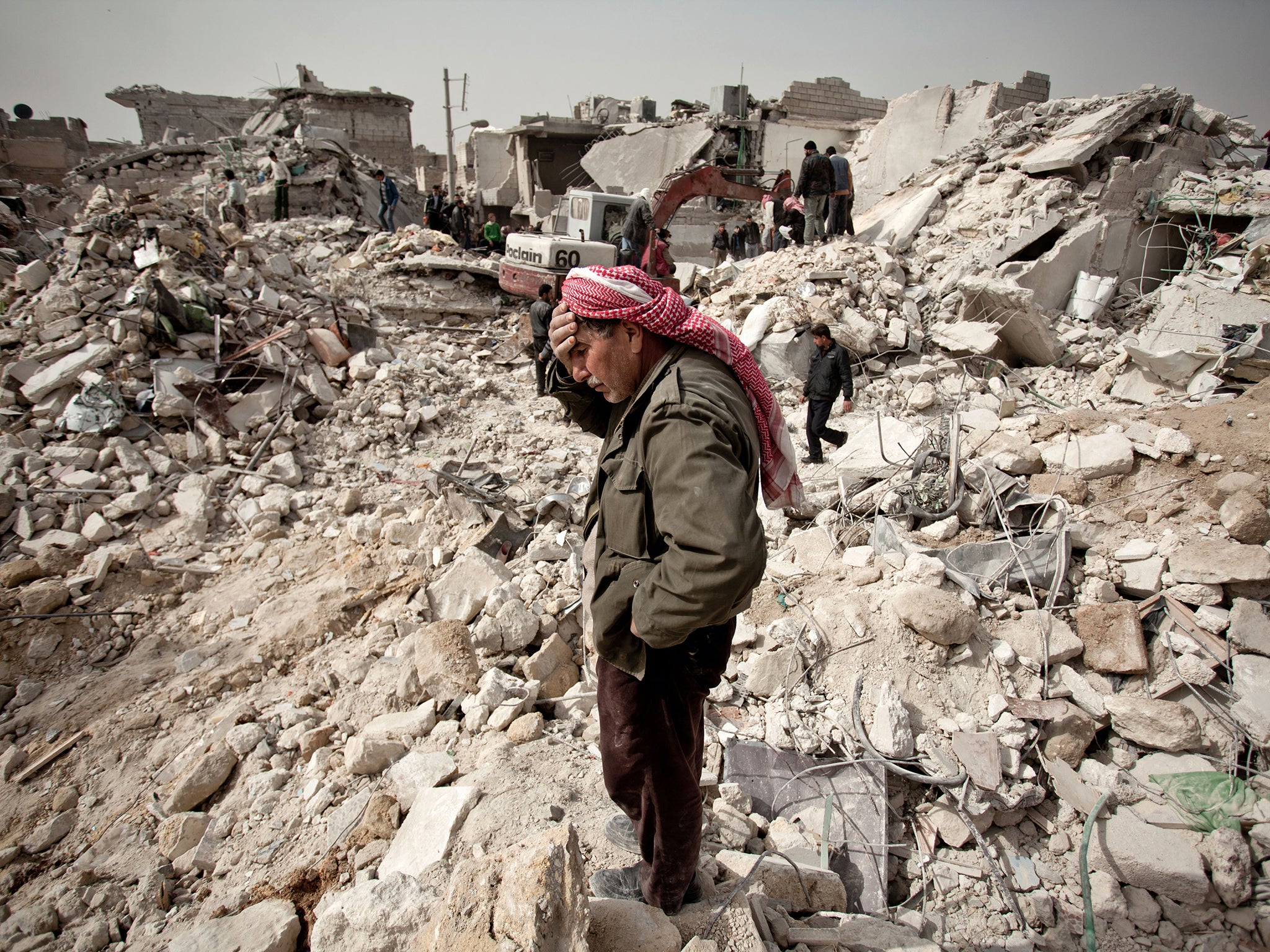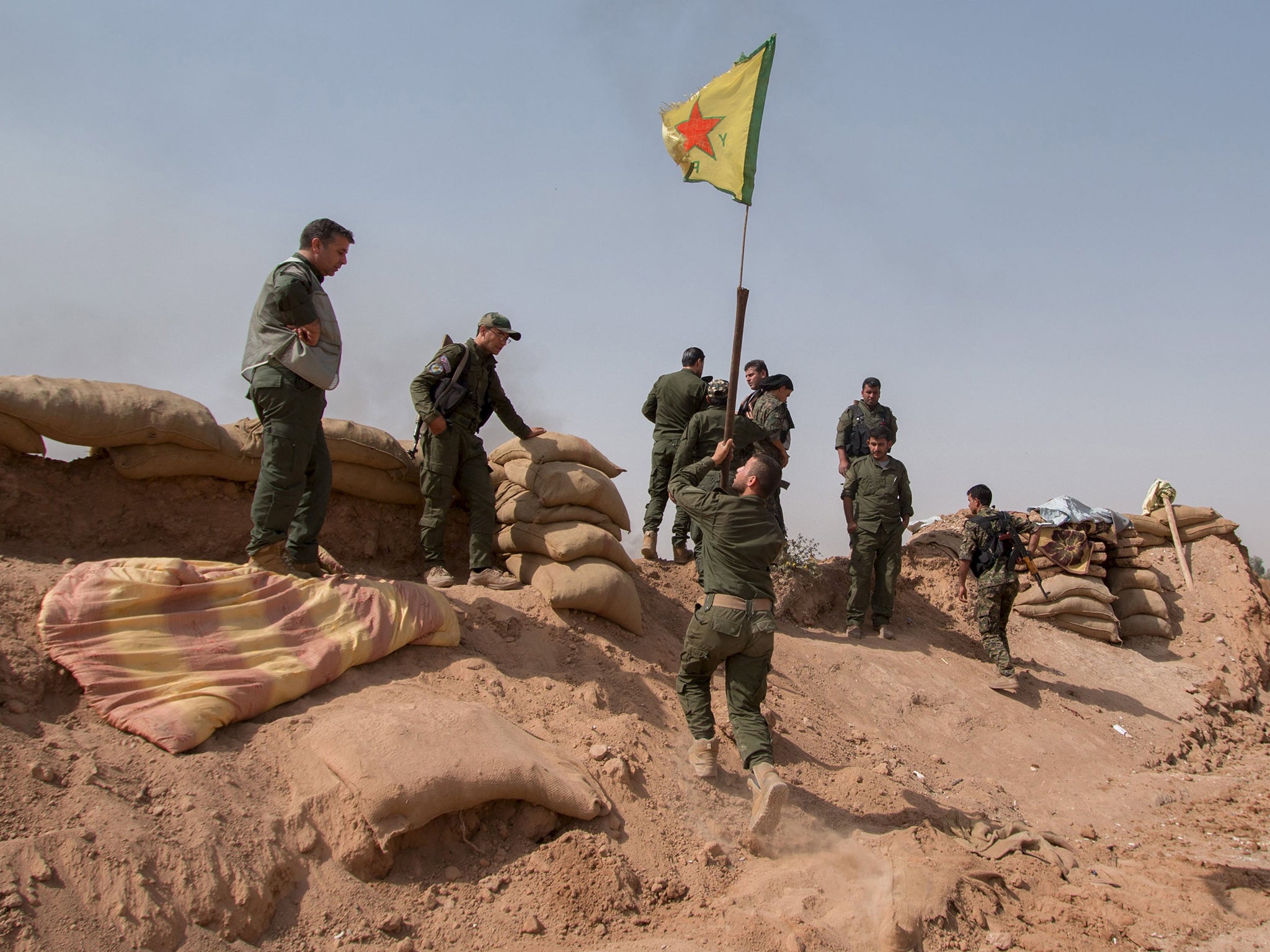Syria crisis: The road to peace means more war
Only by destroying Isis forces on the battlefield can there be a possible end to years of bloodshed


Your support helps us to tell the story
From reproductive rights to climate change to Big Tech, The Independent is on the ground when the story is developing. Whether it's investigating the financials of Elon Musk's pro-Trump PAC or producing our latest documentary, 'The A Word', which shines a light on the American women fighting for reproductive rights, we know how important it is to parse out the facts from the messaging.
At such a critical moment in US history, we need reporters on the ground. Your donation allows us to keep sending journalists to speak to both sides of the story.
The Independent is trusted by Americans across the entire political spectrum. And unlike many other quality news outlets, we choose not to lock Americans out of our reporting and analysis with paywalls. We believe quality journalism should be available to everyone, paid for by those who can afford it.
Your support makes all the difference.Presidents Obama and Putin are meeting in New York to talk about possible moves to end the war in Syria. Chancellor Angela Merkel says that Assad should be involved in future negotiations. Turkey’s President Erdogan, previously adamant that the Syrian leader must go as a precondition for talks, says much the same thing. The signs are positive compared with the diplomatic paralysis over Syria during the past four years.
But here in this Kurdish-controlled corner of north-east Syria, it is difficult to share in this mood of vague optimism. The triangle of territory known to the Kurds as Rojava is the most peaceful part of Syria, though this is not saying a lot. One day last week, I went to Hasaka, a mixed Kurdish-Arab city that Islamic State (Isis) had assaulted but failed to capture in an assault three months ago. Parts of it are defended by the Kurdish military forces known as the People’s Protection Units (YPG) and parts by the Syrian army, National Defence Force paramilitaries and pro-Assad militia of uncertain loyalties. YPG commanders say they have no communication with Assad’s men.
The city of Hasaka, once a commercial centre and home to a university, was described to us by one Kurdish observer as “being a little bit safe”, while another said guardedly that it was “safe compared to other cities”. Isis has no positions inside Hasaka, but is present in villages just to the south. As we drove into the city, we could see from the number of empty-looking houses and closed shops that many inhabitants had fled, giving the largely deserted streets a menacing feel.

We went to a military headquarters of the YPG, following a convoluted route around large earth and rubble mounds to find the entrance. It gradually became apparent from the heaps of shattered masonry and twisted metal that somebody had exploded a very large bomb here, which had completely demolished the main gate. The YPG commander, Lawand Rojava, confirmed this, explaining that nine days earlier a suicide bomber in a vehicle packed with six or seven tons of explosives had tried to reach the headquarters and, when stopped, had blown himself up along with two YPG fighters.
At about the same time, there were two other explosions in the city: one at a checkpoint in the south not far from the Isis front line, which killed 21 civilians and two policemen, and another in al-Mahata Street in the centre of Hasaka, which killed a further 43 people. “The bombers were probably helped by a sleeper cell,” said Commander Rojava, whose headquarters are far back from the road and had been only slightly damaged by the massive blast.
It is a measure of the extreme violence in Syria these days that people only an hour’s drive away in Qamishli, the biggest city in this part of Syria, had not heard that 68 people had been killed by these suicide bombings. In other parts of the country, barrel bombing by the Syrian air force inflicts a similar toll on a daily basis. Until this horrendous level of violence is brought down, it is difficult to see peace negotiations achieving anything.
It is possible that the Russians have enough influence to get the barrel bombing of civilian areas stopped as part of a deal. But what should be done about Isis? It controls more than half the country and intends to kill its enemies, not talk to them. Paradoxically, any plan for peace in Syria must include a plan for war against IS and the jihadi militants.
Just how this is to be done is argued over in the front line in Hasaka, just as it is discussed in Washington, London and Paris. In a military hospital we visited on the outskirts of the city, wounded YPG fighters had different opinions on what should be done. Shuresh Amuda, 35, a veteran who had lost his right eye when his truck went over a pressure mine, said that the main aim of everybody had to be to defeat Isis.
Did this mean that the US should bomb Isis while it was fighting the Syrian army? Shuresh believed the Americans should do so, saying: “Wherever Daesh [Isis] is, I am happy they should be hit.” Commander Rojava, who was sitting nearby, said he did not agree because if the US bombed Isis “when it was fighting the Syrian army, it would legitimise the Assad regime”.
The following day we saw the Syrian Kurdish leader, Saleh Muslim, who said that if the regime collapsed and was replaced by Isis and its jihadi equivalents, “it would be a disaster for everybody”. The one goal should be to defeat Isis, and this can only be done militarily.
It is refreshing to talk about the future prospects for peace and war in Syria with those doing the actual fighting because discussion is free of the self-deception and wishful thinking so frequent outside the country. Nobody here sees much difference between Isis, Jabhat al-Nusra or Ahrar al-Sham and other al-Qaeda clones. Nobody supposes that there are “moderate” Islamists of any strength with whom there can be negotiations. This view was comically borne out last week when a small force of supposed moderates sent by the US army to Aleppo promptly handed over their weapons to Nusra.
Real peace in Syria has to be accompanied by a more intense and effective war against Isis. Though its fighters have suffered defeats at the hands of the YPG backed by US airpower, they are more than holding their own against the Syrian and Iraqi armies, as was shown by IS’s capture of Ramadi and Palmyra in May. Does bombing Isis when it is fighting the Syrian army legitimise Assad as Commander Rojava suggested? Not necessarily, since such military action would be in support of the Syrian state rather than the regime.
Hitherto, there has been an air of unreality about the feeble efforts to end the war that has destroyed Syria. They were supposed to begin with Assad stepping down, despite the fact that, battered though the Syrian army has become, it has always been the strongest military force in Syria. Since this has long been obvious, foreign governments, whatever their protestations to the contrary, cannot have cared much until recently if the war continued. The Western powers gave priority to keeping in with their regional Sunni allies and believed that, whatever difficulties the war was causing them, it was causing worse problems for their traditional enemies in Moscow, Tehran and Damascus, not to mention Hezbollah in Lebanon.
Past precedents do not make one hopeful about present peace moves because too many crises have been wrapped into one. The mass flight of refugees from Syria to the EU has given a sense of urgency, but probably not enough. Isis has many enemies, but they are not united or determined enough to defeat it. It is unclear if a way can be devised to share power geographically and institutionally between the two sides in this civil war. In Hasaka, this all makes peace seem a long way off.
Join our commenting forum
Join thought-provoking conversations, follow other Independent readers and see their replies
Comments